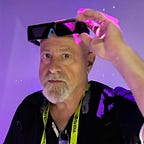Might Meta Rise Again? A Silicon Valley Story
It’s the kind of story they tell in Silicon Valley. A young man, brash and confident, emerges out of somewhere prestigious, maybe Stanford, or Google, with an idea so disruptive, yet expected and logical, it seems inevitable. In this case, the holy grail is screen replacement, the end of the monitor. By 2021, the hero predicts, Augmented Reality will be nothing but a strip of glass before our eyes, allowing the real and imaginary to co-exist and even mingle. Our desktop will travel with us. We’ll never look down at our hands again. It sounds intuitively right, like an idea whose time has come.
In this case, the hero is Meron Gribetz, who came to Silicon Valley via the Israeli Defense Force, with a short stopover at Columbia University where he started Meta in his dorm room while studying computer science and neurology. The Meta prototype was hacked together from Epson 3D glasses and an Intel 3D camera. An early Kickstarter raised $194,000. Gribetz was selected by Y Combinator. The company raised a 23 M Series A round from investors which include celebrity VC Tim Draper. Things were breaking Meta’s way.
When he bounded onto the TED stage to demo the Meta 2 in February 2016, Gribetz was on the verge of raising another 50M from Tencent, Lenovo, and Comcast. He gave a triumphant demo of the Meta 2 which featured shared 3D models, architecture and a klugey demo of telepresence. Gribetz concluded with a bold prediction. “Before TED, in January 2017, everyone at Meta is going to be throwing away our monitors and replacing them with a truly natural machine.”
I was wowed by the two short product demos I did with the Meta 2. The headset was light and airy and has an astounding 90-degree field of view. It is hella dorky looking and tethered. I loved exploring the hand tracking and gesture-based navigation. “It was developed at a tenth of the cost of its competitors, and in many ways, it exceeded their capabilities,” Griberz told me in a phone call in January, 2019. “Of course, it had its drawbacks as well. It took its environment tracking (SLAM) a year to catch up to the Hololens. But still, the Meta 2 was rated highest in image quality, the thing one cares about most in an AR headset.”
Hardware is hard. And expensive. Really, really expensive. Sales channels take years to develop. And software had to be adapted or developed for the Meta platform, so an SDK had to be created and marketed to developers, who are reluctant to develop for a platform with no customers. The headset also has to comply with enterprise security protocols. Use cases have to be developed. Oddly, none of Meta’s strategic investors, including Lenovo, which is all in on XR, provided the total support Meta needed.
Instead, Dell stepped up and agreed to sell the Meta 2 into enterprise. Gribetz told me they trained hundreds of salespeople, and developed several successful pilots, providing a ray of hope for the company. But all this happened relatively recently and took valuable time. At the same time, Meta focused on building apps for the markets in which it was gaining traction: engineering, design, and sales. But sand was falling through the hourglass. Sales cycles for new technology are often longer as customer education and testing is required.
At the 11th hour, a Chinese private-equity firm and real estate entity committed to a 20M investment but the Chinese government, locked in a trade war with the US, blocked the deal. On September 3, 2018, Meta furloughed most of the company. Gribetz said he hoped it would only be a few weeks, but the bank called its loan soon after that. Out of luck and out of money, Meta, Inc. shut down.
In the Silicon Valley fable that started this story, a friendly venture capital firm would offer Gribetz a sinecure as an “entrepreneur in residence” until he created or connected with a new startup. But that’s not how this story ends. In a court-supervised asset sale, a mysterious bidder purchased Meta’s assets and intellectual property. Gribetz was reluctant to say anything about this, other than the expected boiler plate about upcoming announcements. Might Meta rise again, like the Phoenix from the ashes?
Amidst rumors and snarky stories about Meta’s alleged demise, Gribetz asked me to assure Meta owners and fans that their product will be supported. “AR promised too much too soon,” Gribetz said.“We tried to set realistic expectations while the biggest players were making fake videos with special effects” While the Meta corporation may be part of tech history, Meta tech may be back, and soon, Gribetz predicted. “There is still a big window for AR now. The gap between product vision and readiness is closing.”
Originally published at www.forbes.com on January 22, 2019.
